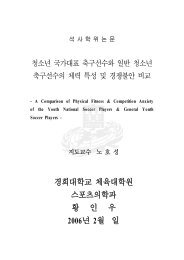경희대학교 동서의학대학원 의 학 영 양 학 과 김 선 아
경희대학교 동서의학대학원 의 학 영 양 학 과 김 선 아
경희대학교 동서의학대학원 의 학 영 양 학 과 김 선 아
Create successful ePaper yourself
Turn your PDF publications into a flip-book with our unique Google optimized e-Paper software.
Ⅱ. Collagen and Ascorbic acid<br />
L-ascorbic acid stimulates procollagen synthesis in cultured human skin<br />
fibroblasts without appreciably altering noncollagen protein synthesis. The<br />
effect is unrelated to intracellular degradation of newly synthesized<br />
procollagne.(Lind J, Stewart CP, Guthrie D. 1953) Levels of mRNA for pro α<br />
-1(I), pro α-2(I), and α-1(III), measured by hybridization with the<br />
corresponding cDNA probes, are elevated in the presence of ascorbic acid,<br />
whereas the level of mRNA for procollagen, measured in a cell-free<br />
translation assay, are specifically increased in the presence of ascorbic acid.<br />
Thus, ascorbic acid appears to control the expression of three different<br />
procollagen genes, each of which is located on a separate chromosome. It is<br />
proposed that intracellularlly accumulated procollagen in ascorbate deficiency<br />
may lead to a traslational repression of procollagen synthesis. Ascorbic acid<br />
may relieve this block by promoting hydroxyproline formation and,<br />
consequently, secretion of procollagen from the cell. The increased level of<br />
procollagen mRNA under the influence of ascorbic acid may be secondary to<br />
increased synthesis of procollagen polypeptides; the control point may be<br />
gene transcription or mRNA degradation.<br />
Ⅱ-1. Ascorbic acid<br />
Unlike most other animals, humans and guinea pigs are unable to<br />
synthesize ascorbic acid by virtue of the fact that they lack L-gulono-γ<br />
-lactone oxidase, the last enzyme in the pathway for synthesis of<br />
L-ascorbic acid from D-glucuronic acid. When humans are deprived of<br />
- 32 -

















